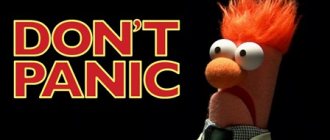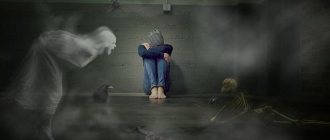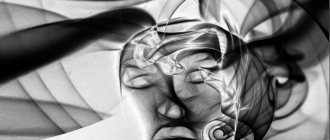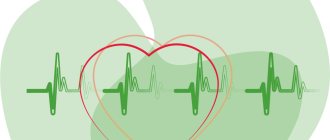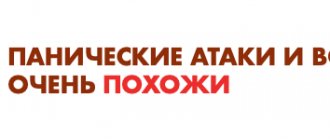How to properly treat panic attacks? What are the symptoms and is it possible to cope with a panic attack at home? If you've ever experienced a feeling of shortness of breath, coupled with a rapid heartbeat and anxiety, you've probably wondered how to get rid of a panic attack for good. In this state, a person feels a wave of unreasonable fear, which causes dysfunction of the central and autonomic nervous systems. Uncontrollable actions of the body often occur, for example: high blood pressure, sweating, dizziness, lack of air, palpitations, etc. A panicky fear of death arises. Such an experience can last from several minutes to several hours. In severe conditions, a person remains in this state constantly, with periods of deterioration and improvement of the body’s condition. Signs of such a disorder of higher nervous activity can often be observed in residents of large cities.
We can help everyone who is still wondering where to treat panic attacks in Moscow, and those who have already had unsuccessful therapy experiences. Our methods of treating panic attacks are completely safe and time-tested. We have been helping people restore their health for over 30 years.
Treatment of panic attacks in the clinic
The Transfiguration Clinic has been operating since 1990․ This is the first private company in the post-Soviet space․ We have awards from state and non-state foundations and are recognized as the best in Russia. The process takes place exclusively using proprietary technology, which has been developed since the clinic began operating and is being more and more modernized every year․ The technology has shown its high productivity over time. Treatment of panic attacks in the clinic may include a set of procedures, so we try to take into account the wishes of the patient himself and choose the most optimal option for the person. The team hardly changes, so the practices used do not lose their uniqueness, as they adapt to realities and become safer to use.
Benefits of therapy in our center
Neutralization of the disorder occurs in stages: Initially, each client is consulted and problems are diagnosed․ The outpatient part lasts 1.5 months, during which the patient will attend classes 2–3 times a week․ The next stage is clinical observation – from 6 to 9 months․ During the period of relapse, you can contact specialists at any time․ At these stages, methods that are recognized as effective throughout the world are used․ For example, rational psychotherapy, phototherapy, hypnotherapy․ These procedures are complemented by massages, physical therapy and doctor-prescribed diets․ To achieve results, it is important to remember that the problem cannot be eliminated with the wave of a magic wand․ This is a complex multi-step process that will lead to the desired outcome, the main thing is to have enough time․
Clinic for the treatment of panic attacks in Moscow
Over 30 years, the Transfiguration Clinic has accumulated significant experience in treating panic attacks, phobias, obsessive-compulsive disorders and other problems with the nervous system. We have several obvious advantages that set us apart from the general number of hospitals.
- Work around the clock․
- Call a specialist to your home․ We understand that not all of our clients have sufficient resources and energy to reach us․
- Treatment of disorders in both mild and severe forms.
- We help even if previous treatment was not successful.
- Development of unique recovery programs, prescription of special medications. We do not believe that there are “standards” by which anyone can be treated, so we only take an individual approach.
- Helping patients of all ages, because anyone can face this condition.
- The presence of comfortable rooms in the center, providing the patient with constant attention from the staff.
- Affordable prices without additional costs and hidden fees, which you can find on our website. In our proposals, we immediately present the entire range of necessary support to achieve the desired result.
- Using effective and scientifically proven techniques.
- The use of original drugs, we do not replace drugs with cheaper “analogs”․
Signs of illness
Every person has experienced one-time signs of a panic attack. However, not everyone has this condition for a long time. The intensity of the underlying measure of anxiety attacks can vary widely: from a pronounced state of panic to a feeling of internal tension. When somatics comes to the fore, experts call this situation “uninsured.” A low level of the emotional component is more often observed in neurological and therapeutic activities, and also during the development of the disease, the degree of fear increases.
There are many symptoms of panic disorder. Among them.
- Rapid breathing and heart rate.
- Headaches and any other pain.
- Mortal fear.
- Muscle tension for no reason.
- Severe anxiety or panic.
- Shortness of breath and feeling of lack of air.
- Interruptions in the functioning of the heart.
- Apathy.
- Suffocation.
- Cold extremities or increased sweating.
- Dizziness.
- Increased blood pressure.
- Vomiting and nausea.
- Heaviness in the chest area.
- Feeling of a lump in the throat.
If you notice similar symptoms appearing, do not self-medicate․ Panic attacks can be treated in our clinic in Moscow․ It’s convenient, inexpensive, and most importantly – effective․
Remember that you should never delay treatment for panic attacks! It is worth turning to competent, qualified specialists who will work with you gradually and correctly.
For more detailed information, you can call the phone number listed on the website, write an email, or make an appointment․
Don't be afraid, we will definitely help you!
Signs and symptoms of panic attacks
During a panic attack, a phobia arises - the fear of losing consciousness, going crazy, or dying. A person ceases to control the situation, he is not oriented in time and place, and sometimes he is not aware of his own personality.
Panic attacks plague even completely healthy and optimistic people. However, they rarely experience attacks of anxiety or fear, which end when they get rid of the problem. It happens when an attack is not as dangerous as the disease that caused it.
The most common signs and symptoms of panic attacks are:
- dizziness - PAs promote the release of adrenaline, a person feels the approach of danger and escalates it more and more. This is the main symptom that gives rise to the attack;
- if you do not overcome dizziness, shortness of breath, rapid heartbeat will appear, blood pressure will increase, and sweating will increase;
- throbbing pain in the temples, a state of suffocation, pain in the heart, nausea and vomiting, thirst, strong feelings and fears.
Psychological symptoms:
- incoherence, limited understanding;
- feeling of a lump in the throat;
- subjective feelings of distance;
- lack of perception of one's own actions;
- fear of death;
- fear of committing a shameful act.
A panic attack is characterized by an onset that is not associated with the presence of a real danger, an abrupt increase and gradual subsidence of symptoms.
Not everyone knows what exactly is happening to them. PA is often confused with heart disease - their symptoms are similar. A panic attack can begin with pain in the chest, a person lacks air, and his heartbeat increases. The patient tries to relieve the attack with Corvalol, but it does not bring any effect.
The attack lasts from a couple of minutes to a couple of hours. Frequency – several times a day, 1-2 times a month. Often occur for no reason. But there is a pattern - they happen either only on the street or indoors, alone or in company. PAs are not dangerous, but over time a person develops depression, phobia, and neurosis.
Original treatment of panic attacks in the clinic
We treat panic attacks only with effective and proven techniques that have stood the test of time and shown to be highly effective. Already in the first hours you can feel a significant improvement in your condition.
If you are suffering and want to get rid of the feeling of frequent anxiety, contact the specialists of the Transfiguration Clinic. We successfully fight various psychosomatic manifestations; our specialists, using unique proprietary techniques and classical types of treatment, are ready to help you restore your psycho-emotional state.
Disease statistics
According to statistics, 5% of the Russian population is susceptible to these disorders. Women suffer from them most often. The onset of the disease is typical between the ages of 14 and 54 years, but in most cases it occurs in people in the age group from 20 to 40 years. Thus, the primary manifestations of the disease are observed at the most productive age. This disorder is characterized by disruption of metabolic processes in the midline structures of the brain.
Often, a panic attack itself can be a symptom of another pathology: coronary heart disease, gastric ulcer, mental disorder. In this case, anxiety goes away after getting rid of the underlying disease.
The doctor chooses the treatment method depending on the type of disorder and clinical features. Single attacks and constant anxiety with the formation of avoidance rituals require different approaches to treatment. In some cases, drug therapy is used, in others - psychotherapeutic methods.
Panic disorders occupy a leading position among the reasons for seeking medical help. The main source is most often difficult life situations that a person has previously experienced or is experiencing during the period of the onset of the disease, as well as accumulated stress. The appearance of disorders of this type can also be facilitated by the use of various chemical substances with psychoactive properties.
Telephone consultation Individual discounts and bonuses for treatment
The doctor's consultation
Therapeutic programs
Treatment programs are tailored to a person’s individual parameters based on the latest scientific data and practical approaches in neurology and psychotherapy.
Treatment of a panic attack is carried out comprehensively. Our specialists combine pharmacological and psychotherapeutic methods and provide consultations to relieve symptoms until the desired result is achieved. Each session, each psychotherapeutic manipulation leads to a certain result. The doctor monitors the dynamics and how the patient’s condition improves, adjusting the treatment program along the way. If a panic attack occurs in an acute form, the psychotherapist takes a set of measures to urgently relieve symptoms and restore the patient’s mental state.
The initiation of therapy is based on diagnostic measures and emergency medical care, which include:
- reception and examination of the patient by a psychiatrist-psychotherapist;
- examination by specialized doctors;
- stopping an attack;
- preventing recurrent attacks;
- relief of derivative syndromes;
- preventing relapses.
Diagnosis of panic attacks
It is impossible to die from a panic attack; it does not pose a danger to the basic systems of the body, but if we talk about the quality of life, it decreases. Constantly feeling anxiety, tension, weakness, and experiencing pain, a person can hardly rejoice or be happy, even if events happen that he has been waiting for so long.
When carrying out diagnostic measures to make a diagnosis, a psychotherapist uses the following test methods:
- Sheehan scale (a method for assessing the general level of anxiety and the degree of its increase);
- Beck scale (method for assessing the level of depression).
The doctor creates a plan for basic therapy. It is compiled only according to the individual parameters of the body. Depending on the severity and complexity of the disease, the fight can take place either using only psychotherapeutic techniques, or complex neurometabolic therapy is recommended.
Psychotherapy for panic attacks
Before relieving a panic attack, the specialist makes sure that it is not associated with possible somatic chronic diseases.
Psychotherapy, depending on individual characteristics and needs, can take place in different modes and intensities. Our specialists most often use cognitive behavioral therapy as a basic technique.
Cognitive behavioral therapy
We proceed from the fact that psycho-emotional disorders are most often caused by artificially formed or reflexive patterns of behavior. Under the influence of these factors, panic disorder can often worsen. At the same time, intervention based on the principles of learning can have a preventive and therapeutic effect on them.
Depending on the situation, other quite effective methods may be used or included in the overall plan.
Indications and contraindications
Despite the fact that fluoxetine is considered a pharmaceutical drug in narcology, it is not prohibited in our country. However, it can be purchased at a pharmacy only with a doctor's prescription. It is important to take the drug under the strict supervision of a treating specialist. The doctor will be able to select a safe dosage and duration of treatment without negative consequences for the body.
In what cases is the use of the drug indicated?
- depression (average daily dose 20 mg, maximum – 80 mg);
- schizophrenia;
- panic attacks;
- bulimia nervosa (60 mg x 3 times a day, no more than 7 days);
- in the treatment of addiction;
- OCD (60 mg x 3 times a day, no more than 5 weeks);
- neuroses;
- social phobia;
- anxiety states.
Contraindications
In what cases and under what health conditions is it not recommended to use this remedy?
- suicidal tendencies;
- epileptic seizures;
- diabetes;
- kidney and liver diseases.
Psychotherapy used for panic attacks
- rational therapy,
- positive,
- behavioral,
- problem crystallization method,
- phototherapy,
- transactional analysis,
- hypnotherapy.
Main stages of psychotherapy
- Didactic. Understanding the logic of the disease and choosing the appropriate treatment strategy.
- Cognitive. The second stage is aimed at identifying maladaptive thoughts of a so-called automatic nature, which support feelings of disappointment, apathy, and depression.
- Behavioral. The goal of the third stage is to introduce into the patient’s consciousness a strategy that promotes the emergence of a sense of self-esteem (respect for oneself as an individual) and positive life motivation.
Biotherapy
In case of severe panic attacks or complications, our specialists resort to drug therapy. This is mainly a special neuromebabolic therapy aimed at relieving acute attacks and restoring metabolic processes in the brain. This therapy not only helps to stop attacks, but also nourishes and restores the structure of neural connections. In the case of the vestibular form, neurometabolic stimulants, which have a sedative effect, are added to the treatment regimen. All drugs used in the Preobrazhenie clinic do not cause dependence (addiction), are completely safe and are recommended for use by leading scientific and practical institutes of the world.
Additional procedures may be prescribed to enhance the effect of treatment.
Physiotherapy
The methodology includes the following areas:
- color therapy;
- MDM therapy;
- aromatherapy with oils that have a calming effect;
- Lenarotherapy and electrosleep.
Massage and exercise therapy
Light massage is also used as an additional treatment method, especially in the neck area. At the initial stage of the program, exercises are performed aimed at general relaxation of the body, as well as breathing exercises that help level out anxiety symptoms. At the next stage, it is necessary to perform general strengthening gymnastics. Exercises should be moderate and regular, since uneven distribution of physical stress and excessive stress can cause a deterioration in the patient's condition. When performed, the greatest blood flow should be provided to those parts of the body that suffer the most as a result of the attacks.
Phytotherapy
Treatment of panic attacks with herbal medicine is ineffective and this method can be used as an additional, supportive therapy in parallel with the main one. For this type of therapy, decoctions of nettle, lemon balm, common valerian, oregano, sweet clover, watch, St. John's wort, primrose, speedwell, linden, strawberry, calendula, wormwood, lily of the valley, mordovnik, black nightshade, mint, motherwort, as well as a sedative collection are used.
Diet therapy
Nutritionists for such disorders recommend sticking to table No. 12. The following foods should be excluded from the patient’s diet:
- onion and garlic;
- confectionery;
- fatty meat broths;
- smoked meat products;
- cucumbers;
- alcoholic drinks;
- coffee and strong tea.
Some restrictions are imposed on the consumption of meat products and salt. Patients should consume legumes and dairy products, as well as iron-rich meats. Substances that help reduce stress levels are also found in fish and other seafood.
Time frame for panic attack treatment
In this case, we indicate the duration of therapy approximately, based on the majority of cases we observe. Supervision of outpatient programs is designed for 1.5 months. In this case, the patient must attend sessions at least 2-3 times every week. This is followed by a clinical observation phase lasting from 6 to 9 months. During this period, the patient can consult a specialist at any time if there is a suspicion of a relapse.
Advantages of the method and its effectiveness
Timely seeking help gives a high chance of completely curing the patient and putting him into a state of stable remission. At the same time, the effectiveness of conventional therapy in other medical institutions is only 20-30%. The effectiveness of therapy at the Transfiguration clinic reaches up to 95%. Treatment is carried out according to our proprietary methods. The methods have been developed at the clinic since 1990 and continue to be improved and supplemented based on scientific developments. In the most severe cases - 70-80%. In this case, only those cases in which we observed complete recovery were taken into account, taking into account follow-up for more than 5 years. At the same time, completely ineffective cases of treating panic attacks using our methods have not been observed for more than 15 years. Insufficient effect is considered to be an incompletely cured disorder, which in 90% of cases is justified directly by the disease itself and 10% by a violation of the regime. The productivity of the program is achieved thanks to the experience of our specialists and a combination of psychotherapy, physiotherapy, psychopharmacotherapy, as well as other additional techniques.
Medication support
A psychiatrist is involved in selecting medications for the treatment of panic attacks. A properly selected medication regimen will quickly reduce the frequency, intensity and number of symptoms of panic attacks. Appointments may include:
- Tranquilizers for quick relief of panic attacks. These drugs can cause addiction, so in no case should you increase the dosage on your own and use them daily, just to prevent attacks. These remedies are first aid for a severe panic attack, nothing more.
- Antidepressants for panic attacks. These drugs are used in serious cases where a panic attack occurs due to depression. This indicates a serious stage of the disease, which may require not only treatment for panic attacks, but also treatment for depression in a hospital.
- Beta blockers. The drugs quickly reduce high blood pressure and tachycardia during panic attacks.
- Nootropics. People suffering from panic attacks often complain of problems with memory and thinking in general. These drugs help improve blood circulation and brain performance.
Mistakes patients make in treating panic attacks
Self-medication is a major problem for people who experience periodic anxiety attacks. This approach often aggravates the condition and leads to the development of complications. Recovery in such patients requires a more in-depth approach and will be longer. Self-administration of psychotropic medications can lead to the formation of a chronic process, and such a disease is always less treatable.
Modern techniques
We provide supervision in various forms, depending on the wishes of the patient and his objective condition, both in a day hospital, an extended day hospital, and on an outpatient basis. We do not believe in miracles, we treat panic attacks even if previous treatment did not help, the most complex disorders of the psychological spectrum with the help of science and our experience.
Experience in treating panic attacks at home
As many years of practice have shown, no one can treat panic attacks on their own at home. Considering that a panic attack is not a disease, but only its sign, a symptom, therapy for a panic attack, as such, leads to a change in the symptom. That is, panic attacks may go away, but they may be replaced by another symptom.
Therapy must be carried out not only to relieve signs of the disease, but it is necessary to first identify all the hidden factors of formation and manifestation, directly affecting the disease itself.
Therefore, we strongly recommend that you only contact a good specialist in person and follow all his recommendations.
What are panic attacks and why do they happen?
A panic attack is a condition in which a person experiences inexplicable, overwhelming fear and severe anxiety. During attacks there is a sharp release of adrenaline and norepinephrine. This is a psychophysical reaction to danger. It is believed that about 10% of the world's population suffers from panic attacks. More than half of them are women. More than 2/3 of people suffering from panic disorder try to cope with the disease on their own. It happens that lack of treatment leads to various mental illnesses. A timely visit to a doctor will help solve this problem.
The attack is accompanied by unpleasant symptoms:
- high blood pressure (up to 220 to 170)
- heavy sweating
- fever or chills
- labored breathing
- lump in the throat
- increased heart rate (more than 120 beats per minute)
- tremors and numbness of the limbs
- nausea
- vomit
- dizziness
- depersonalization
- fear of dying or going crazy
Symptoms usually last from 5-10 minutes to several hours. There are repeated cases of frequent attacks during the day. Sometimes a panic attack can last up to 24 hours. With regular attacks, we can talk about panic disorder. In any case, only a specialist can diagnose the disease. If you find one or more of the above symptoms, this is a reason to consult a doctor.
The occurrence of a panic attack depends on many factors. According to patients, the first signs may appear some time before the attack itself. Early symptoms often include severe fatigue, along with unexplained anxiety, blurred vision, and chest pain. A panic attack can be triggered by stress, whether positive or negative; memories associated with the traumatic event; threat to life and health, state of alcohol and drug withdrawal. Often, panic attacks are directly related to some disease: a violation of somatophoric functions, depression, PTSD, endocrinological and cardiovascular problems, and various phobias. Seizures may occur when taking certain medications. If you are prone to panic attacks, be sure to tell your doctor who prescribes your medications.
People suffering from anxiety syndrome are susceptible to panic attacks. With this disorder, the human body produces abnormal amounts of adrenaline and norepinephrine. Therefore, in case of panic attacks and constant anxiety, experts recommend getting tested for these hormones to determine the cause of such conditions. In some cases, consultation and treatment with a neurologist is sufficient, but most often the symptoms develop further and the person requires more serious therapy.
Another reason for panic attacks is various phobias. For example, in people with a fear of closed spaces, a panic attack begins when they get into an elevator, a closed room where a person cannot control the exit, or public transport. In essence, this state is a psychophysical reaction to danger, in the absence of a real threat. Regular panic attacks greatly affect your quality of life. It is difficult for such people to get to work, to the store, or to the doctor. Restrictions due to panic attacks often lead to depression, depression, and suicidal thoughts.
Very often, the first attack of a panic attack occurs during physical or mental stressful situations. The cause may be heavy sports activity, overwork at work or study, and even a large amount of tea or coffee.
Protracted conflict or being in a stressful situation for a long time also provokes panic attacks. A person creates a state of panic, constantly expecting something bad. From a psychological point of view, these types of attacks arise from the suppression of emotions, the inability to recognize one’s own negative feelings and work with them. In such cases, the likelihood of recurrence of panic attacks increases.
If an episode of a panic attack does not recur for a long time, the person usually forgets about it. In the case of regular panic attacks, there is a fear of new panic attacks. Fear causes the release of adrenaline and a person ends up in a vicious circle. A panic attack begins to control a person’s life.
Another factor influencing panic attacks is genetic predisposition. If any of your relatives suffered from an illness such as panic disorder, then it is likely that the disease was inherited. At the IMC Addiction By Yuzapolsky clinic, we pay special attention to the genetic aspect when diagnosing and treating panic attacks. Sometimes it is enough to detect hormonal causes, eliminate the imbalance of adrenaline and norepinephrine and get rid of panic attacks forever. It has also been scientifically proven that the occurrence of panic attacks is influenced by a lack of serotonin and dopamine, which help a person cope with stress. Such studies are an excellent prevention for hereditary causes of the disease. For example, you can learn about your children's predisposition to panic attacks and correct their condition before the first symptoms appear.
So, in short, the causes of panic attacks are as follows:
- hereditary factors
- childhood and adolescent psychotraumas
- excess adrenaline and norepinephrine
- lack of serotonin and dopamine
- prolonged emotional stress
- severe stress
- physical injuries
- sleep deficit
- regular overwork
- excessive physical activity
- pregnancy
- alcohol or drug abuse
A panic attack can cause a lot of trouble. Don't delay seeing your doctor.
